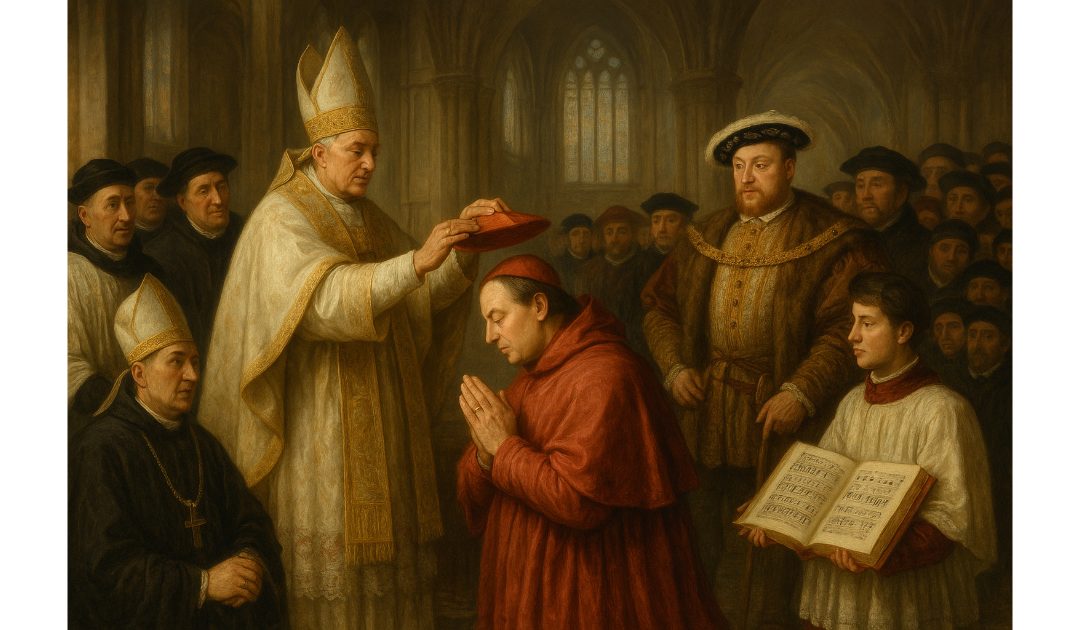On the 10th of September, 1515, Thomas Wolsey was invested as a Cardinal. Thomas Wolsey (c. 1473 – 29 November 1530) was a prominent English churchman, statesman, and cardinal who rose to become one of the most powerful figures in the court of King Henry VIII. His life was marked by remarkable ambition, political acumen, and eventual dramatic downfall.
Early Life and Education
Wolsey was born around 1473 in Ipswich, Suffolk, to Robert Wolsey, a butcher, and Joan Daundy. Despite his modest beginnings, Wolsey’s intelligence and determination set him apart early on. He attended Ipswich School before progressing to Magdalen College, Oxford, where he earned his Bachelor of Arts degree at the remarkably young age of 15. His academic excellence enabled him to secure a fellowship and later become a master at Magdalen College School.
Entry into the Church and Royal Service
Ordained as a priest in 1498, Wolsey’s career advanced rapidly due to his sharp mind and administrative skills. He served as chaplain to Henry Deane, Archbishop of Canterbury, and later to Sir Richard Nanfan, who introduced him to the royal court. By 1507, Wolsey had caught the attention of King Henry VII and was appointed royal chaplain. Following Henry VII’s death in 1509, Wolsey’s fortunes improved dramatically under the reign of Henry VIII.
Rise to Power
Wolsey’s charm, intellect, and tireless work ethic earned him the king’s trust and favour. By 1515, he was appointed Lord Chancellor and became a cardinal, securing his role as Henry VIII’s chief advisor. As Lord Chancellor, Wolsey had considerable influence over both domestic and foreign policy. He was also appointed Papal Legate, giving him authority over the English Church, effectively making him the most powerful figure in England after the king.
Wolsey’s vision for England was one of strong central authority and diplomatic prominence in Europe. He orchestrated significant events such as the Treaty of London in 1518, aiming to establish peace among European powers. Perhaps his most extravagant diplomatic endeavour was the Field of the Cloth of Gold in 1520, where Henry VIII met Francis I of France in a lavish display designed to strengthen Anglo-French relations.
Wealth and Patronage
Wolsey’s wealth and lifestyle reflected his status. He amassed vast estates and built grand residences, including York Place in London (later transformed into Whitehall Palace by Henry VIII). He was also a patron of education, founding Cardinal College (now Christ Church) at Oxford and establishing a grammar school in his hometown of Ipswich.
Downfall
Despite his achievements, Wolsey’s fortunes were tied to his ability to satisfy Henry VIII’s ambitions, particularly regarding the king’s desire to annul his marriage to Catherine of Aragon. Wolsey’s failure to secure the papal annulment, due to complex political pressures involving the Pope and the Holy Roman Emperor, led to his decline.
By 1529, Wolsey was stripped of his offices and properties, retreating to York as Archbishop. However, suspicions of treason grew, and in 1530, he was arrested and summoned to London. Ill and broken, Wolsey died en route at Leicester Abbey on the 29th of November 1530.
Legacy
Thomas Wolsey’s life is a testament to the heights one could achieve through intellect and ambition in Tudor England. He shaped English politics and the Church significantly during his tenure, and his dramatic rise and fall remain emblematic of the volatile nature of power in the royal court.
Wolsey’s contributions to diplomacy, administration, and education left lasting marks. His downfall paved the way for figures like Thomas More and Thomas Cromwell, who navigated the turbulent waters of Henry VIII’s reign in the years that followed.

